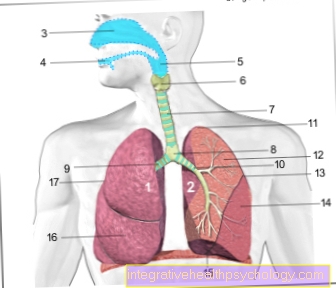Drug addiction
What is a drug addiction?
Drug dependency is an addiction in which those affected take drugs that are not medically sensible, often in too high doses. There is a wide range of potentially addictive drugs.
Perhaps the best-known example of drug addiction is the US opioid crisis. According to studies, several million people are dependent on painkillers there, and thousands of people have already died from overdoses. But drug addiction is also a serious problem in Germany.
Read more on the topic: Opioids

These symptoms indicate drug dependency
Drug addiction can have many symptoms or forms. The WHO therefore defines dependency according to several criteria. At least three must have been fulfilled in the course of the last year in order to speak of an addiction.
These criteria are:
- Craving, i.e. the strong desire or desire to consume the substance in question.
- Difficulty controlling the use of the substance in question.
- Development of tolerance, which means that over time more and more substance must be taken in order to achieve the same effect.
- Withdrawal syndrome when the substance is discontinued.
- Narrowing down to the substance in question. Other activities are neglected in favor of substance use.
- Persistent substance use, although you are aware that consequential damage will be accepted. However, the boundaries between harmful use, abuse or dependency on a drug are often blurred, so that an accurate diagnosis can be difficult.
These drugs have high potential for drug addiction
A variety of drugs can cause addiction. The best-known example of this are strong pain relievers. These are also grouped together as opioids because they act on so-called opioid receptors. This group also includes heroin, which was originally developed as a pain reliever.
Modern opioids differ in their strength and effect, but there is a great risk of developing addiction, especially if they are used for a long time and improperly.
In addition to painkillers, sedative drugs and sleeping pills are a group of drugs with a high potential for addiction. Benzodiazepines are often taken as a sleep aid. If used over a longer period of time, however, there is a high risk of developing addiction or withdrawal symptoms.
It is similar with drugs that are used to calm down. Benzodiazepines also belong to this group.
But drugs that seem harmless at first glance can also cause addiction. These include, for example, certain nasal sprays or laxatives. The main risk here is getting used to taking it, so that normal body function is no longer guaranteed without medication.
In addition to these groups, there are many other drugs that can cause drug addiction.
You might also be interested in the topic: Dependence on nasal spray
This is how drug addiction is treated
The first and very important step of treatment is recognizing that you are drug addict. It is imperative to seek professional help as drug addiction is a serious condition.
The basic concept of treatment is usually withdrawal, i.e. stopping the substance in question. This can happen abruptly or gradually, depending on the treatment or substance.
With many drugs, withdrawal takes place on an inpatient basis. Withdrawal symptoms can be severe or even life-threatening, but they can usually be treated well. In the case of severe or long-term dependency with little chance of success for withdrawal, substitution can also be sought. This is especially the case with opioids. In this case, drugs are not completely discontinued, but given to the person affected in a controlled manner. This is to prevent uncontrolled, risky and illegal consumption with serious consequences for the patient.
Often, drug addiction is linked to other diseases. Mentally ill people in particular often try to self-medicate by taking certain medications or drugs, which can lead to drug addiction. Therapy for the original disease can also improve drug dependency.
Read about this too: Therapy of an addiction
withdrawal
Withdrawal is an important part of treatment. An attempt is made to stop taking the substance. A basic distinction is made between cold and warm withdrawal. With cold withdrawal, the intake of the corresponding substance is stopped suddenly and without replacement.
In contrast, with warm withdrawal one tries to slowly taper off the corresponding drug. Warm withdrawal is preferred especially for substances that can cause severe withdrawal symptoms.
Withdrawal symptoms often occur when drugs have been taken in high doses for a long period of time so that they have become used to the drugs. Depending on the drug, they can vary in strength. Severe withdrawal symptoms can even be life-threatening without treatment. In this case, slow withdrawal in an inpatient setting is recommended.
You might also be interested in the topic: Drug withdrawal
Duration of treatment
The duration of a treatment differs depending on the patient and drug. With some medications, a single stopping of the intake with cold withdrawal is enough for a successful treatment. Longer treatments are required much more frequently, however. These can also take place in an inpatient setting and over several weeks.
A major problem with addictions is relapse. An addiction can break out again after years. In this case, prompt professional help is of great importance.
forecast
The prognosis for drug addiction also differs greatly depending on the drug concerned. Withdrawal is problematic with many medications and relapses are common. Other drug addictions are much easier to treat and have a very good prognosis.
But it is not only the treatment that is important for the prognosis. Other factors, such as the social environment or the general living situation, also have an important influence.
What can be the consequences of drug addiction?
Drug addiction can have serious consequences. Consumption itself can damage the body. Medicines are often taken in too high doses or for too long. Because of the addiction, side effects are often accepted or ignored.
The kidneys and liver are particularly at risk. They metabolize or excrete the drugs. They can be harmed by the drugs or their breakdown products. However, drug addiction can also lead to serious problems in other organs.
By narrowing down on drug consumption, there may be a loss of social contacts or other activities.
If drugs are procured illegally, legal problems can arise. Addictions such as drug addiction can also cause serious problems financially.
With many drugs, overdose is a serious problem. In the worst case, death threatens.
But the consequences don't always have to be so dramatic. In the case of many drug addictions, consumption tends to be hidden and concealed. In this case, the conflict between wanting to take the drug and knowing about its harmful effects can be very stressful.





























